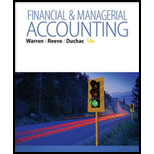
Concept explainers
Cash payback method:
Cash payback period is the expected time period which is required to recover the cost of investment. It is one of the capital investment method used by the management to evaluate the long-term investment (fixed assets) of the business.
In simple, the cash payback period is computed as follows:
Net present value method is the method which is used to compare the initial
To discuss: The uses of the cash payback period for analyzing the financial performance over the net present value method.
Trending nowThis is a popular solution!

Chapter 25 Solutions
Financial & Managerial Accounting
- Transactions: Dec. 3 Wrote off Langston Corporation’s past-due account as uncollectible, $645.75. M203. 9 Accepted a 90-day, 8% note from Farris Company for an extension of time on its account, $2,400.00. NR23. 18 Received cash from Storage Solutions for the maturity value of NR19, a 90-day, 9% note for $2,000.00. R455. 21 Coastal Supply dishonored NR21, a 90-day, 8% note, for $3,000.00. M245. 30 Received cash in full payment of Langston Corporation’s account, previously written off as uncollectible, $645.75. M232 and R463. Task 1 Journalize the transactions for Miller Corporation in Questions Assets that were completed during December of the current year. Use page 12 of the general journal and page 12 of the cash receipts journal. Task 2 Post each entry to the general ledger and to the customer accounts in the accounts receivable ledger. You will not need to make entries to the Item columns of the ledgers. Task 3 Continue to…arrow_forwardE-M:11-18 Using payback to make capital investment decisions Consider the following three projects. All three have an initial investment of $600,000. Net Cash Inflows Year Project L Project M Project N Annual Accumulated Annual Accumulated Annual Accumulated 1 $ 150,000 $ 150,000 $ 100,000 $ 100,000 $ 300,000 $300,000 2 150,000 300,000 200,000 300,000 300,000 600,000 3 150,000 450,000 300,000 600,000 4 150,000 600,000 400,000 1,000,000 5 150,000 750,000 500,000 1,500,000 6 150,000 900,000 7 150,000 1,050,000 8 150,000 1,200,000 1. Determine the payback period of each project. Rank the projects from most desirable to least desirable based on payback. 2. Are there other factors that should be considered in addition to the payback period?arrow_forwardKindly help me with this General accounting questions not use chart gpt please fast given solutionarrow_forward
- Horngren's Financial & Managerial Accounting: The Managerial Chapters, 8th Edition E-M:10-12 Making pricing decisions Sufyan Builders builds 1,500-square-foot starter tract homes in the fast-growing suburbs of Atlanta. Competition among developers is fierce. The homes are a standard model, with any upgrades added by the buyer after the sale. Sufyan Builders’ costs per developed sublot are as follows:Land $ 59,000Construction 124,000Landscaping 6,000Variable selling costs 5,000 Sufyan Builders would like to earn a profit of 14% of the variable cost of each home sold. Similar homes offered by competing builders sell for $208,000 each. Assume the company has no fixed costs. Questions:1. Which approach to pricing should Sufyan Builders emphasize? Why? 2. Will Sufyan Builders be able to achieve its target profit levels? 3. Bathrooms and kitchens are typically the most important selling features of a home. Sufyan Builders could…arrow_forwardCan you provide a detailed solution to this financial accounting problem using proper principles?arrow_forwardPlease explain the solution to this general accounting problem with accurate explanations.arrow_forward
- I am looking for the correct answer to this general accounting problem using valid accounting standards.arrow_forwardPlease provide the correct answer to this general accounting problem using valid calculations.arrow_forwardCan you solve this general accounting question with the appropriate accounting analysis techniques?arrow_forward
 Managerial AccountingAccountingISBN:9781337912020Author:Carl Warren, Ph.d. Cma William B. TaylerPublisher:South-Western College Pub
Managerial AccountingAccountingISBN:9781337912020Author:Carl Warren, Ph.d. Cma William B. TaylerPublisher:South-Western College Pub Cornerstones of Financial AccountingAccountingISBN:9781337690881Author:Jay Rich, Jeff JonesPublisher:Cengage LearningPrinciples of Accounting Volume 2AccountingISBN:9781947172609Author:OpenStaxPublisher:OpenStax College
Cornerstones of Financial AccountingAccountingISBN:9781337690881Author:Jay Rich, Jeff JonesPublisher:Cengage LearningPrinciples of Accounting Volume 2AccountingISBN:9781947172609Author:OpenStaxPublisher:OpenStax College Intermediate Financial Management (MindTap Course...FinanceISBN:9781337395083Author:Eugene F. Brigham, Phillip R. DavesPublisher:Cengage Learning
Intermediate Financial Management (MindTap Course...FinanceISBN:9781337395083Author:Eugene F. Brigham, Phillip R. DavesPublisher:Cengage Learning





